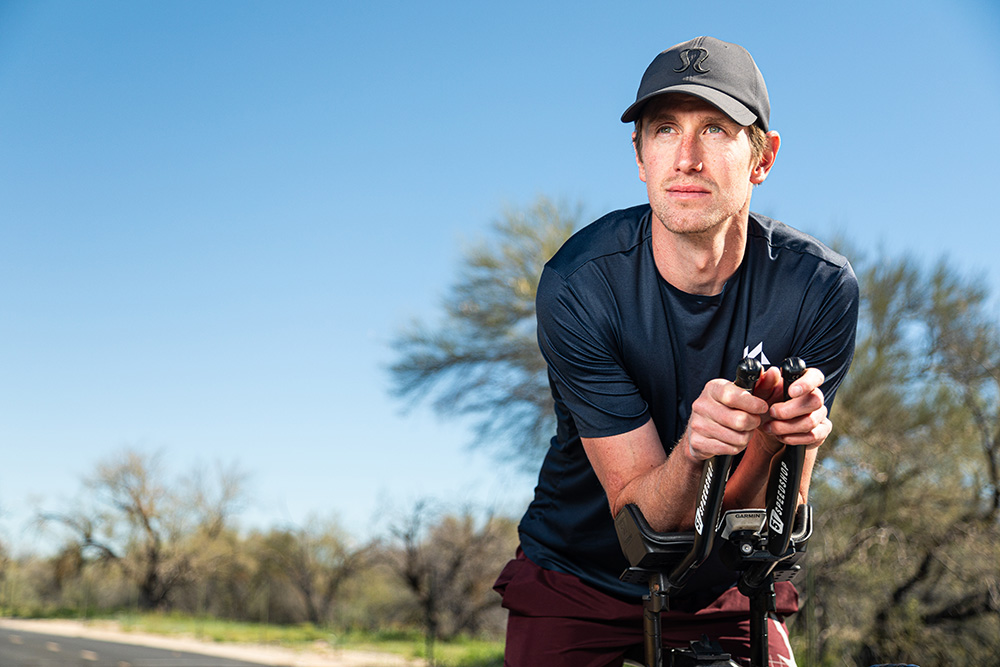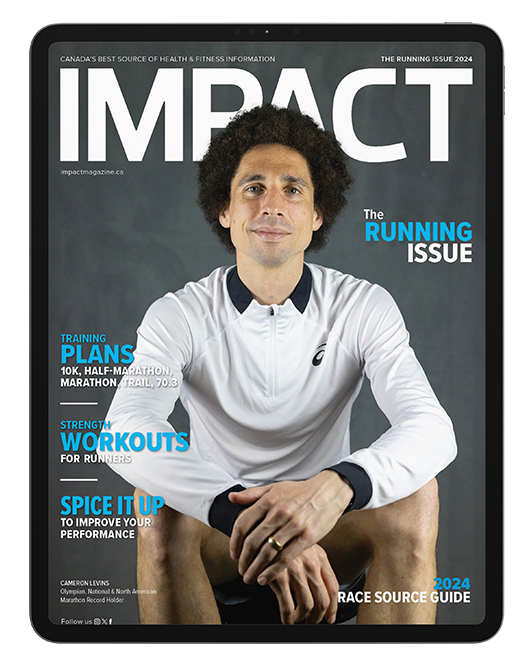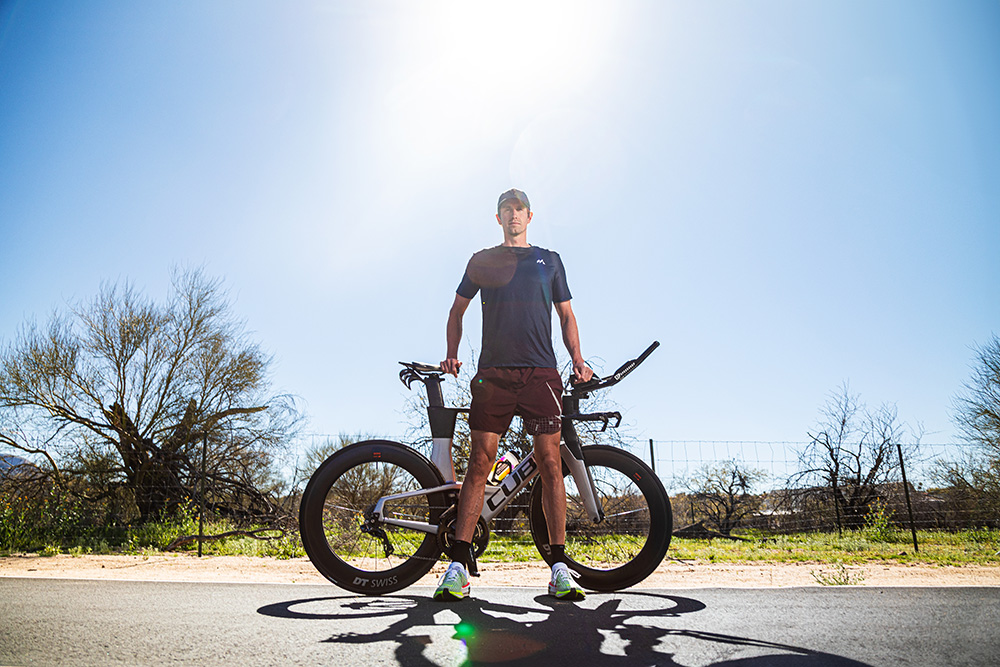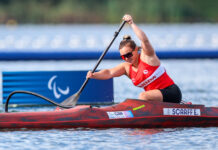Thirteen years ago, Jason Pohl’s dream of playing in the NHL was crushed. Growing up on a farm in Red Deer, Alberta, he played hockey from age six, moving up the ranks as goalie. But at age 16 when he was playing Juniors—the semi-pro level where players are scouted for the NHL draft, he suffered a spontaneous pneumothorax—a collapsed lung.
He had 12 more left-lung collapses over the next four years leading to major lung surgery. By the time he was 20, the recurring health issues, surgery and the ongoing rehabilitation resulted in him not making many game rosters. “It took a lot of deep motivation and drive for me to overcome the heartbreak of leaving hockey,” says Pohl.
With every setback I think it’s the universe giving us a lesson, to grow into something bigger and better.
But motivation is what he had. Pohl, 33, is now a successful pro triathlete, having competed in 16 IRONMAN competitions and ranked just outside the top 50 in the world. However, his road to being a top endurance athlete hasn’t been a smooth one, as he faced more physical and mental challenges. After regaining his health post-surgery, he became intrigued by endurance sports. In 2012 he ran Red Deer’s Woody’s RV World Marathon in an impressive 3:18—his gateway endorphin high to the triathlon.
The next year the 22-year-old signed up for his first triathlon, the Olympic distance at Sylvan Lake, Alberta. Running wasn’t an issue, but he had to learn how to swim, and he raced on his grandfather’s 1970s steel road bike. In July 2014 he competed in his first IRONMAN in Whistler and, with a time of 10:21 and coming second in his age group, he qualified for the highly coveted World Championships in Kona the following October. He didn’t have time to celebrate though. Not knowing how to hydrate and fuel properly in the Hawaiian heat landed Pohl in the hospital post-race, where he was treated for severe dehydration and put on potassium and fluid IVs.
Only hours after fighting for his life he said the race “was the coolest experience of my life.” He was inspired by the pros and eager to exceed the limits he’d just found. He wanted to turn pro. “There are always going to be hard times and failures,” says Pohl. “With every setback I think it’s the universe giving us a lesson, to grow into something bigger and better.” Throughout his athletic journey he’d have to trust this philosophy time and again.

Going pro would mean leaving a successful career in finance, which he had built since graduating in 2014. In 2018 he moved to Boulder, Colorado to join his wife and triathlete Jess Kahnke to launch his pro career.
Along his trajectory Pohl says he’s learned that surrounding himself with supportive people doing amazing things has made him perform at a higher level. American Olympic triathlete Ryan Bolton was one such support. He coached Pohl to fourth place at IRONMAN Coeur d’Alene in June 2021 with the day’s fastest marathon (2:47) in now familiar conditions of 48 C. This earned him his second Worlds qualification in May 2022. Just when he was finally feeling like he was growing into a world class athlete he was struck by bad luck.
Within the next four weeks he suffered two separate concussions, then two months later he was hit by a car, which damaged his left hip followed by his compensating right hip flexor. The final blow came when he tore both Achilles tendons at IRONMAN Mont Tremblant in August 2022 and could barely walk. “I was pushing too hard and not taking the time to take care of my injuries,” says Pohl. “It was the lowest moment in my professional career and I came very close to quitting.”
Coming from a farming background, Pohl has always prided himself on being the hardest worker and says he knew deep down that he hadn’t expressed his best yet. Who better to reaffirm his self-belief and reassemble Pohl’s broken body than another IRONMAN athlete, Dr. Roger Menta, a sports specialist chiropractor at Calgary’s Move to Move clinic. They began to rewrite his biomechanics. Says Menta: “Throughout his junior life he’d put his feet essentially in casts, which is what a hockey skate is like, and didn’t learn to move or mobilize his ankles.”
They worked on improving his mobility, form efficiency and strength. Menta says the reason why Pohl progressed so rapidly, to return to his 30-hours-a-week training load, was that he dedicated several hours a day for many months to his rehab both in Calgary and Boulder.
From not finishing his August 2022 race, he went on to become the third fastest Canadian of all time in 7.46 (2.39 marathon)
in June 2023 at Challenge Roth, Germany. Three months later he placed second overall (7:03) at IRONMAN Maryland, earning
him a spot at the 2024 World Championships in Kona in October.
When moments get grim throughout the long day of an IRONMAN, Pohl draws upon his why and connects it all back:
“I think about everything I’ve had to overcome—the injuries and setbacks, the self-doubt and disbelief… then I’ll say, ‘I’m doing this!’ and it brings me back into the race.”
You may also like: Athletes with IMPACT

Read This Story in Our 2024 Running Issue
Featuring Canadian Olympic, National & North American Marathon Record holder Cameron Levins. Run your way around the world with some cool, quirky and unconventional races. Train for 10 km right up to a marathon – plus a 25 km trail run and 70.3 program. Strength workouts for runners, spice it up to improve your performance and so much more.
















